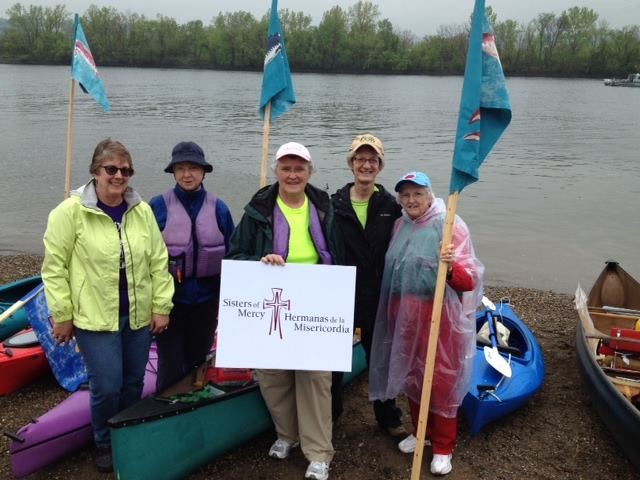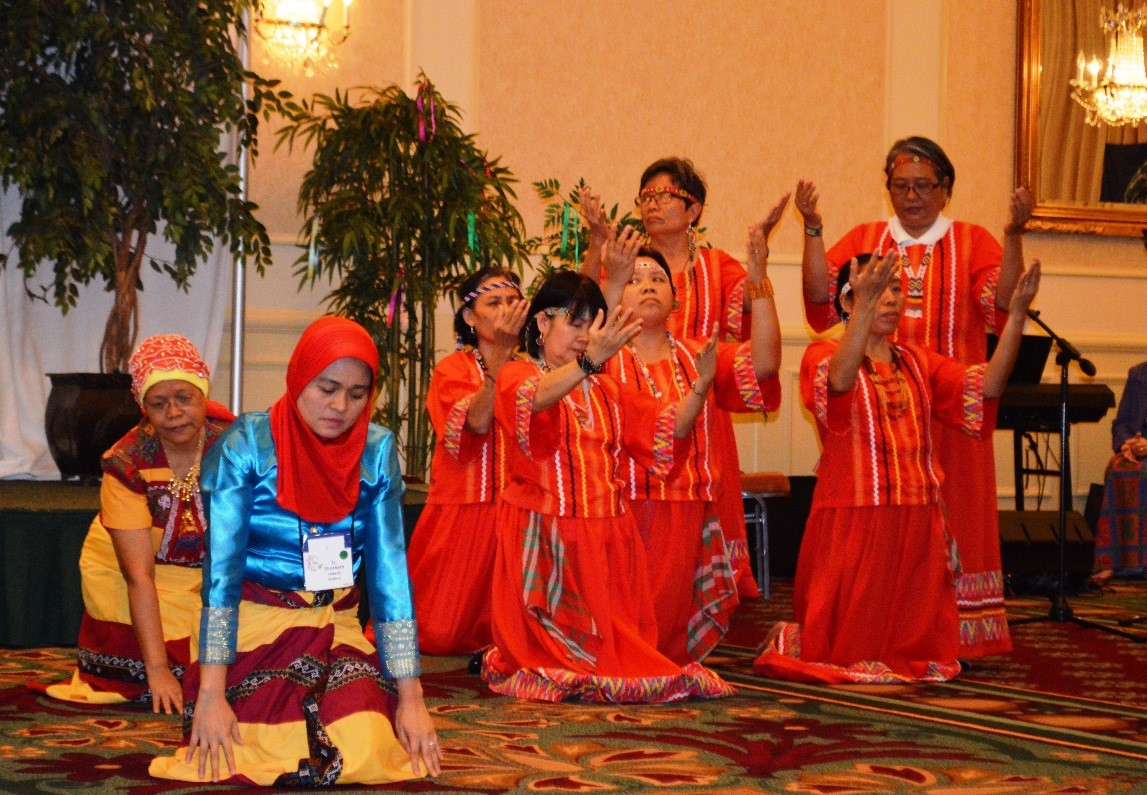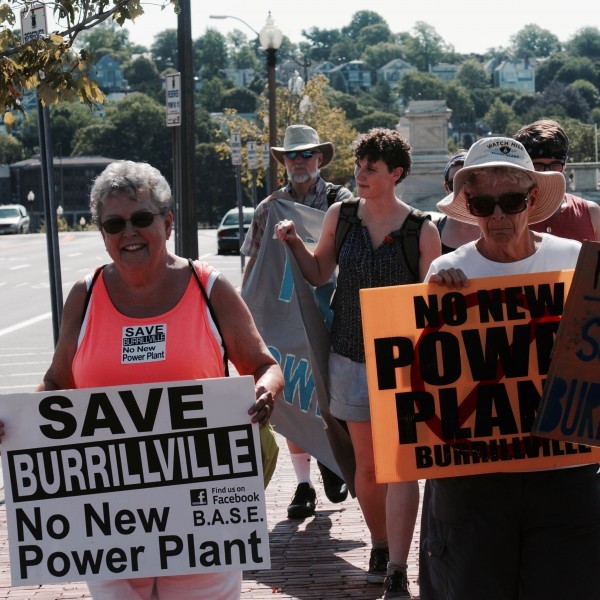|
Since the start of 2016, Mercy Sisters, Associates, Co-workers, Students, Volunteers and Friends have been engaged in prayer, education, advocacy and transformation of personal behaviors and institutional practices in response to our critical concern for Earth. Among the examples are:
35 groups are participating in the Mercy International Reflection Process to explore the themes of the “cry of the Earth and the cry of the poor” in Pope Francis encyclical Laudato Si'. Groups are meeting throughout the U.S. and in Argentina, Peru, Guyana and Belize.
Mercy Investment Services continues to encourage companies to reduce their carbon footprint, adopt and strengthen climate-impact policies, and improve their environmental practices, and most recently has successfully urged PPG to remove lead as an ingredient in paints and coatings sold to consumers.
The Institute Communications Office produced a 7-minute video of Institute Justice Team member Marianne Comfort talking about the presence of Mercy at the international climate talks outside Paris in December and follow-up actions. You may find it here.
 Mercy Associates Kathy Quick and Marilyn Hart, Sister Kathleen Pritty, Associate Joanne Scheibly and Sister Julia Werner, pictured from left to right, participated in the Hands Across the Hudson Flotilla in Albany, NY, as part of global Break Free from Fossil Fuels actions in mid-May. This “kayaktivism” blocked passage of barges carrying fracked oil out of the Port of Albany. The actions in Albany also included a march to the Port of Albany and to a low-income housing community where only a chain-link fence separates apartments from rows and rows of parked oil tank cars. Mercy Associates Kathy Quick and Marilyn Hart, Sister Kathleen Pritty, Associate Joanne Scheibly and Sister Julia Werner, pictured from left to right, participated in the Hands Across the Hudson Flotilla in Albany, NY, as part of global Break Free from Fossil Fuels actions in mid-May. This “kayaktivism” blocked passage of barges carrying fracked oil out of the Port of Albany. The actions in Albany also included a march to the Port of Albany and to a low-income housing community where only a chain-link fence separates apartments from rows and rows of parked oil tank cars.
Other advocacy throughout the United States has included:
• Sisters Kay O’Brien and Kathleen Erickson were among those who joined world-renowned NASA climate scientist Dr. James Hansen at a rally outside a meeting of Warren Buffet’s Berkshire Hathaway companies in Omaha, Nebraska. Hansen introduced a resolution calling for the companies to conduct a climate risk assessment, while the advocacy group Bold Nebraska delivered a petition with the same demand.
• Mercys in Michigan urged their state senators to reject two bills that turn back Michigan’s efforts to promote clean, renewable energy. These measures would increase the cost of installing roof-top solar panels, thus making them less competitive with fossil fuels, increase air and water pollution, provide no enforcement mechanism for Michigan’s clean energy goals, and jeopardize the state’s growing clean energy economy
• Sister Rose Marie Tresp, justice director for the South Central Community, invited two parishioners at her church in North Carolina to join her and others with Citizens Climate Lobby at a meeting with U.S. Rep. Patrick McHenry to seek support for a proposal to impose a fee on carbon and return the funds collected to taxpayers.
• Sister Karen Donahue, a justice coordinator for the West-Midwest Community, had published a letter to the editor in the Detroit Free Press criticizing Marathon Petroleum’s request to increase emissions for certain pollutants at its Detroit refinery. She joined other advocates in pointing out that the nearby neighborhood, predominately made up of African-Americans, is already the most-polluted zip code in Michigan. The state agency making the decision on the request already has been implicated in the situation in Flint in which the majority-African-American city residents’ drinking water was contaminated with lead for more than a year before officials took action.
• Sisters Karen Donahue and Mary Ellen Howard joined about 30 other protesters in front of the Detroit office of the Michigan Department of Environmental Quality to call out the agency’s failure to protect citizens from health hazards. They called for stricter enforcement of standards regarding water and air quality as well as drilling. They mentioned not only the case of contaminated water in Flint, but also potential for oil drilling at a Southfield church, a permit petition for an expanded waste facility in Detroit, and concerns over sulfur dioxide emissions from the Marathon Petroleum refinery along Interstate 75 near the Rouge River border.
The Institute Justice Team moderated a webinar that examined the human rights impacts of fracking and fracked-gas infrastructure. Featured was Tom Kerns of the Permanent People’s Tribunal on the Human Rights Impacts of Fracking, which will look at the costs of this extractive practice on human health, the environment, the climate, local decision-making and the social fabric of communities. Mercy Sister Mary Pendergast, Ecology Director for the Northeast Community, shared about her activism against a fracked-gas power plant and storage facility in Rhode Island.
 Mercy Sisters from the Philippines performed a dance at the Assembly of the New York, Pennsylvania and Pacific West Community that depicted the importance of water, its destruction through industrialization, and the hoped-for restoration of the balance of nature. Assembly participants were invited to sign a pledge to choose tap water over bottled water and actively support policies that promote clean, affordable water for all. The sisters were also invited to donate to a collection to sup¬port environmental initiatives in the Philippines. Mercy Sisters from the Philippines performed a dance at the Assembly of the New York, Pennsylvania and Pacific West Community that depicted the importance of water, its destruction through industrialization, and the hoped-for restoration of the balance of nature. Assembly participants were invited to sign a pledge to choose tap water over bottled water and actively support policies that promote clean, affordable water for all. The sisters were also invited to donate to a collection to sup¬port environmental initiatives in the Philippines.
 Sister Mary Pendergast, ecology director for the Northeast Community continues to participate in active opposition to a fracked gas powerplant in Burrillville, RI. On July 4th there was a parade with no less than 4 floats demonstrating opposition! Residents cheered as various symbols of poison, death and environmental destruction passed by. #NoNewPowerPlant Sister Mary Pendergast, ecology director for the Northeast Community continues to participate in active opposition to a fracked gas powerplant in Burrillville, RI. On July 4th there was a parade with no less than 4 floats demonstrating opposition! Residents cheered as various symbols of poison, death and environmental destruction passed by. #NoNewPowerPlant
She writes about these experiences:
“We struggle with the ‘rigged game’ of politics. The Energy Facility Siting Board who will grant the permission to build, has three members who were appointed by the Governor. In the Press Conference where Invenergy first announced their plans to come to RI – Our Governor states ‘I know you have choices about where you could be and I’m pleased you’ve chosen Rhode Island and you should know we are going to make sure that you are successful here.’
“We speak up at public comment sessions of the Public Utility Commission, but two members had to recuse themselves because they are also on the Siting Board. Another member of the Siting Board is chair of the Department of Environmental Management, but she has put herself in a lock box so as not to be tainted with information that might cloud her judgement.
“Our ‘bird dogging’ technique of showing up wherever the Governor speaks with ‘No Power Plant’ signs resulted in her visiting Burrillville for a public meeting. I along with members of FANG (Fighting Against Natural Gas) and several Burrillville groups, walked from the state house in Providence to Burrillville High School to draw attention to the meeting. The walk took three days and averaged seven miles a day.
“We also continue to oppose an LNG storage tank in the heart of South Providence as an environmental justice issue. Green Party presidential candidate Jill Stein recently came on a toxic tour of the area.
“The Sisters of Mercy Northeast Community hosted the ‘Nuns on the Bus,’ a group from the social justice lobby Network on their way to the Democratic Convention. The “Nuns” held a forum in Providence called “Mending the GAPS, Reweaving the Fabric of Society.”
The Institute Justice Team is part of a coalition of Catholic organizations based in the Washington, DC, area that has put out a St. Francis election guide for our upcoming presidential and legislative elections to lay out Catholic social teaching for Catholic voters and how that relates to key issues in these elections, which include climate change and other environmental concerns. Marianne Comfort is also part of an interfaith coalition on the environment that is preparing a letter to the transition committee for each candidate, stating our faith principles and the policies that we think are important for a new president and her/his administration to attend to.
Messages to:
Marianne Comfort - Justice Educator at Institute of the Sisters of Mercy of the Americas, United States
Mary Pendergast rsm - Ecology Director for Sisters of Mercy of the Americas Northeast Community
|

 Mercy Associates Kathy Quick and Marilyn Hart, Sister Kathleen Pritty, Associate Joanne Scheibly and Sister Julia Werner, pictured from left to right, participated in the Hands Across the Hudson Flotilla in Albany, NY, as part of global Break Free from Fossil Fuels actions in mid-May. This “kayaktivism” blocked passage of barges carrying fracked oil out of the Port of Albany. The actions in Albany also included a march to the Port of Albany and to a low-income housing community where only a chain-link fence separates apartments from rows and rows of parked oil tank cars.
Mercy Associates Kathy Quick and Marilyn Hart, Sister Kathleen Pritty, Associate Joanne Scheibly and Sister Julia Werner, pictured from left to right, participated in the Hands Across the Hudson Flotilla in Albany, NY, as part of global Break Free from Fossil Fuels actions in mid-May. This “kayaktivism” blocked passage of barges carrying fracked oil out of the Port of Albany. The actions in Albany also included a march to the Port of Albany and to a low-income housing community where only a chain-link fence separates apartments from rows and rows of parked oil tank cars. Mercy Sisters from the Philippines performed a dance at the Assembly of the New York, Pennsylvania and Pacific West Community that depicted the importance of water, its destruction through industrialization, and the hoped-for restoration of the balance of nature. Assembly participants were invited to sign a pledge to choose tap water over bottled water and actively support policies that promote clean, affordable water for all. The sisters were also invited to donate to a collection to sup¬port environmental initiatives in the Philippines.
Mercy Sisters from the Philippines performed a dance at the Assembly of the New York, Pennsylvania and Pacific West Community that depicted the importance of water, its destruction through industrialization, and the hoped-for restoration of the balance of nature. Assembly participants were invited to sign a pledge to choose tap water over bottled water and actively support policies that promote clean, affordable water for all. The sisters were also invited to donate to a collection to sup¬port environmental initiatives in the Philippines. Sister Mary Pendergast, ecology director for the Northeast Community continues to participate in active opposition to a fracked gas powerplant in Burrillville, RI. On July 4th there was a parade with no less than 4 floats demonstrating opposition! Residents cheered as various symbols of poison, death and environmental destruction passed by. #NoNewPowerPlant
Sister Mary Pendergast, ecology director for the Northeast Community continues to participate in active opposition to a fracked gas powerplant in Burrillville, RI. On July 4th there was a parade with no less than 4 floats demonstrating opposition! Residents cheered as various symbols of poison, death and environmental destruction passed by. #NoNewPowerPlant 